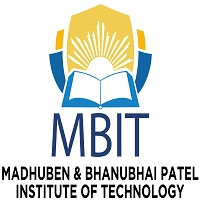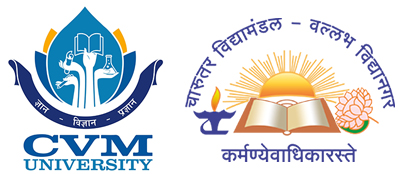Department of Computer Engineering
The Department of Computer Engineering at Madhuben & Bhanubhai Patel Institute of Technology, offers four year degree program to undergrad students. The quality of life has improved significantly with advent of computers. PC, Laptop, cell phones, Internet and Teleconference have become household commodities. The Computer Department has been established in 2009. Since its inception, the department is dedicated to education, research and overall excellence providing a superior teaching environment for its students to flourish in different domains of Computers. Computer Engineering department has always performed brilliantly in academics and holds a proud position among all departments.
Curriculum
We live in the information society. Consequently, computers are nowadays ubiquitous in every aspect of our lives. Computer applications are used in many central sectors of our society: health, bank, security, etc. Of course, education is not an exception, and it introduces unique technical, managerial and most importantly pedagogical issues. These unique features make computers and education a field of study on its own. Software being one of the largest growing sectors of the Indian economy, the department of computer engineering at MBICT has been at the forefront of churning out software engineers with a high caliber of technical expertise. It continues to foster and engender the innovation and breadth of vision necessary to excel in the blooming software industry. The experienced faculty exposes the would be computer engineers to a rigorous and exhaustive curriculum designed to bring out the best in them and to keep them in touch with the latest state of the art technology.
The Department of Computer Engineering understands the need of the current competitive scenario therefore run separate certification programs like CCNA Certification, Oracle Certification, GATE Preparation Classes etc. Department of Computer Engineering also emphasize on improving inter personal skills of students and helps students of improve in each domain.
The Department of Computer Engineering also support students to develop their skills through offering challenging projects and also encourages students to bring up innovative ideas. Computer Department is an exciting place for students to develop their skills and build outstanding career.
To impart quality education through state of the art technologies to achieve academic excellence for transforming students into innovators
- Creating a teaching-learning environment to produce industry ready and self confident graduates.
- Motivate students to engage in creative projects throughout graduation.
- To produce competitive graduates having creative skills and ethical values to succeed in their fields as well as the foundation for life-long learning.
To provide students with strong basic and advanced programming concepts so that they can build solutions or systems for complex problems.
-
- The program provides the fundamental and perspective to attain life-long learning in the thrust areas of Computer Programming.
- To produce graduates who have ability to pursue research or have a successful career in academia or industries or as entrepreneurs.
- The aim is inculcating technical knowledge of the programme and imbibe ethics with moral behaviour in the graduates.
- Engineering knowledge: Apply the knowledge of mathematics, science, engineering fundamentals, and an engineering specialization to the solution of complex engineering problems.
- Problem analysis: Identify, formulate, review research literature, and analyze complex engineering problems reaching substantiated conclusions using first principles of mathematics, natural sciences, and engineering sciences.
- Design/development of solutions: Design solutions for complex engineering problems and design system components or processes that meet the specified needs with appropriate consideration for the public health and safety, and the cultural, societal, and environmental considerations.
- Conduct investigations of complex problems: Use research-based knowledge and research methods including design of experiments, analysis and interpretation of data, and synthesis of the information to provide valid conclusions.
- Modern tool usage: Create, select, and apply appropriate techniques, resources, and modern engineering and IT tools including prediction and modeling to complex engineering activities with an understanding of the limitations.
- The engineer and society: Apply reasoning informed by the contextual knowledge to assess societal, health, safety, legal and cultural issues and the consequent responsibilities relevant to the professional engineering practice.
- Environment and sustainability: Understand the impact of the professional engineering solutions in societal and environmental contexts, and demonstrate the knowledge of, and need for sustainable development.
- Ethics: Apply ethical principles and commit to professional ethics and responsibilities and norms of the engineering practice.
- Individual and teamwork: Function effectively as an individual, and as a member or leader in diverse teams, and in multidisciplinary settings.
- Communication: Communicate effectively on complex engineering activities with the engineering community and with society at large, such as, being able to comprehend and write effective reports and design documentation, make effective presentations, and give and receive clear instructions.
- Project management and finance: Demonstrate knowledge and understanding of the engineering and management principles and apply these to one’s own work, as a member and leader in a team, to manage projects and in multidisciplinary environments.
- Life-long learning: Recognize the need for and have the preparation and ability to engage in independent and life-long learning in the broadest context of technological change.
- To acquire basic knowledge in hardware/software, algorithms, System Software, Computer graphics, Web design, Networking, and advanced computing for solving real-life and Research problems with the perspective of lifelong learning.
- An ability to demonstrate Knowledge of data management systems like data acquisition and big data, Intelligent systems like AI, Data Science and Machine Learning, The techniques of data analytics like pattern recognition and knowledge discovery.
- To develop skills which help to expand professional careers.

